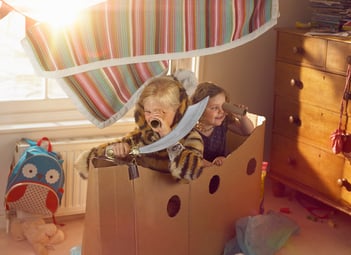 “Just imagine! A few kitchen chairs and clean bedsheets become a fortress deep in the Hundred Acre Wood. One wooden spoon is a microphone, and two more are drumsticks. A stack of old newspapers is a dragon egg of paper mâché waiting to happen. Oh, the possibilities!” (Healthline.com)
“Just imagine! A few kitchen chairs and clean bedsheets become a fortress deep in the Hundred Acre Wood. One wooden spoon is a microphone, and two more are drumsticks. A stack of old newspapers is a dragon egg of paper mâché waiting to happen. Oh, the possibilities!” (Healthline.com)
You might hear imaginative play being called “pretend play” or “role-playing.” It is “an activity that… results in joyful discovery. Play is voluntary… it is fun and often spontaneous.”
With just the aid of a costume or a prop—or through sheer imagination alone—your child can become a king or queen, princess or prince, a superhero, a bear, a lion, a zombie, a space alien. You name it, their imagination can take them there.
During a child’s preschool years, their imagination can help them test out scenarios (what would it feel like, for example, to be an astronaut? A dragon? The very best athlete in the entire universe?) Preschoolers can learn how to address emotions connected with those roles, both positive and negative, and to problem-solve. For example, how would a dragon react if the rival dragon tries to take over the cave?
Therapy Focus shares how imaginative play helps young children to enhance their creativity. They can envision scenes that may not become reality and, through that, experience different perspectives. These benefits can last through adulthood with Psychology Today discussing a study that talks about “clearly creative individuals”— including Nobel Prize winners — who participated in games using made-up words. In other words, they engaged in early imaginative play.
This kind of play can also help in physical development, such as when the queen of the universe needs to use hand-eye coordination to put on her royal gown. So can tucking a cape into the back of one’s shirt to gain superpowers. It can also help with communication skills as the children describe what they’re imagining and why they’re responding to situations in the way they are.
Plus, pretend play can help your child understand the concept of symbols and their importance. This is crucial because so much of our world — from letters to numbers — are symbols that represent something else. Letters represent sounds that help us write and otherwise communicate. Numbers stand for amounts, including dollars, measurements, times and more. Understanding these symbols lays the foundation for reading, writing, math and more.
Nurturing Pretend Play
Scholastic.com shares recommendations to help parents encourage imaginative play in their youngsters. It focuses on filling a box or other space with old clothes, hats and so forth; kitchen props; crates, blocks and more for home building; old phones, silk flowers, and other objects for the pretend home; blankets, old sheets, and fabric; stuffed animals and dolls; pretend money; and more. These objects can inspire imaginative scenarios for preschoolers to act out and they can also enhance ones your children already had in mind.
Psychology Today also notes that parents who regularly explain things to their children, whether it’s about nature or what’s going on in society, and who read or tell bedtime stories, are often most successful at helping their children participate in pretend play.







